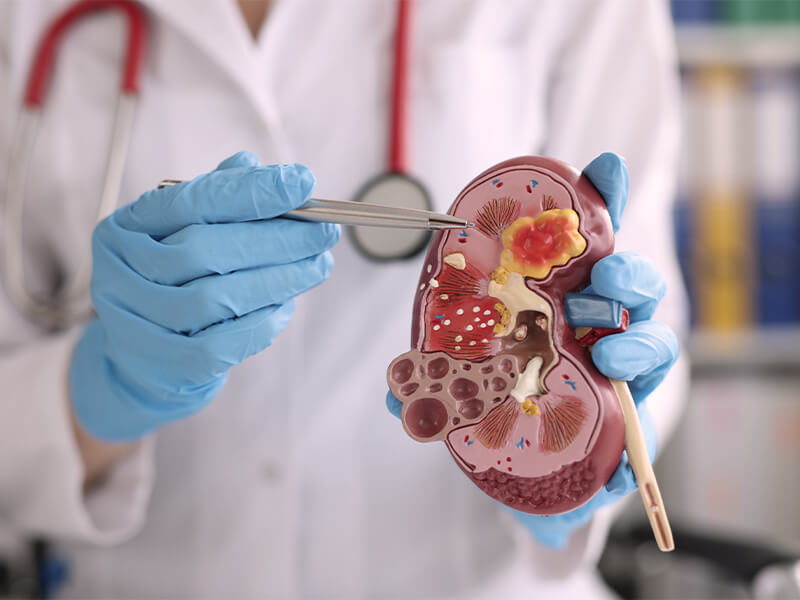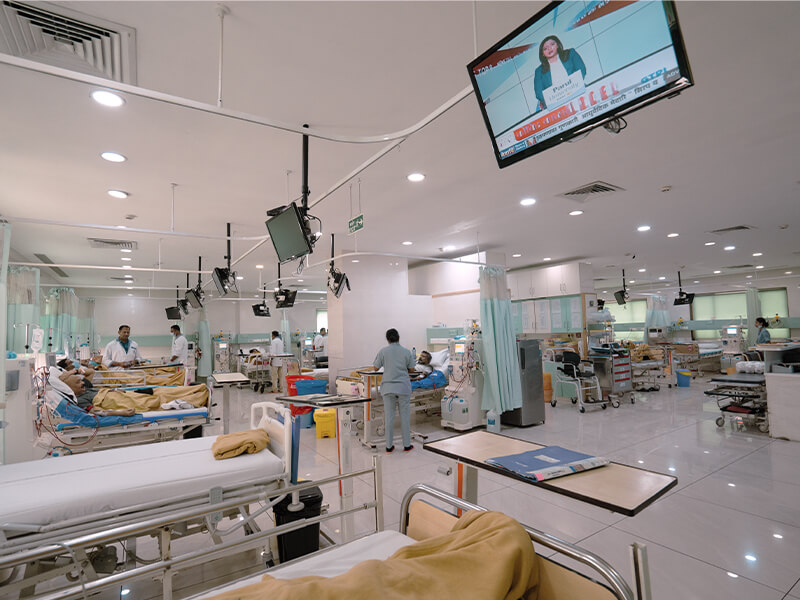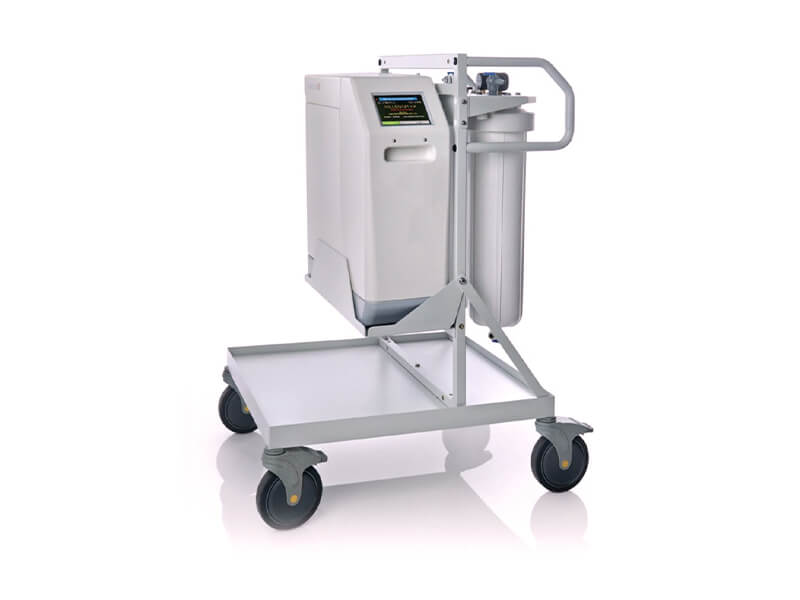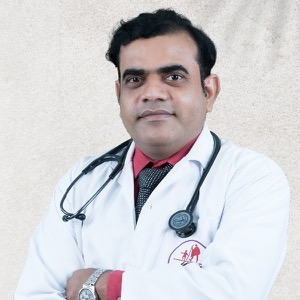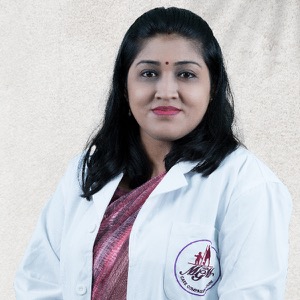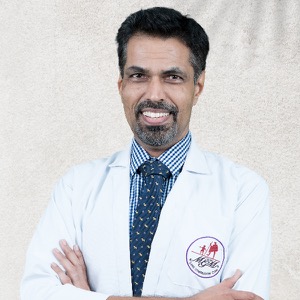The experts at our center invest their time, efforts and expertise to help patients maintain their kidney health through the best modes of treatment.
Our focus is not just early diagnosis and treatment but preventive care by way of various patient education and awareness programs held on a periodic basis by our faculty.
Our team of experts is acclaimed for its’ rare clinical skills and for providing top-notch treatment to all ages ranging from paediatric to geriatric age groups. The team of professionals include, Nephrologist, Urologist and other specially trained support staff.
The Department of Nephrology treats a wide spectrum of Kidney diseases including: Acute Kidney Injury, Chronic Kidney disease, Hypertension, Proteinuria, Hematuria, Diabetic Kidney disease, Renal Cystic diseases, Glomerular diseases like Glomerulonephritis and Nephrotic Syndrome, Lupus associated kidney disease, Urinary tract infections like Cystitis, Pyelonephritis, Kidney stones, Fluid and Electrolyte abnormalities, Hemodialysis, Peritoneal Dialysis and Kidney Transplantation.
Highlights
- We are one of the city’s largest dialysis unit
- Awarded for the 'Best Dialysis Service Provider' by Healthcare Leadership Awards
Services
The Department of Nephrology treats a wide spectrum of Kidney diseases including:
Acute Kidney Injury
Hematuria
Renal Rehabilitation
Intradialytic exercises for muscle strengthening and overall wellbeing of dialysis patients.
Chronic Kidney disease
Peritoneal Dialysis
Performed at home by the patient under close care of the technician and Nephrologist.
Awareness Programs
Patient and public educative sessions about kidney diseases.
Hypertension
Diabetic Kidney Disease
Renal Biopsy under USG guidance
Plasmapheresis
For conditions like Guillain – Barre syndrome, Myasthenia Gravis, Anti GBM disease, ANCA Vasculitis, Severe Lupus nephritis, Transplant rejection
Proteinuria
Procedures available in support with ancillary departments
Arteriovenous Fistula placement and care, Vascular catheter placement (temporary and permanent), Peritoneal Dialysis catheter placement.
Kidney Transplantation
Our team has achieved remarkable success in performing both cadaveric and live kidney transplants. Through our expertise and dedication, we have been able to give hope to those facing kidney failure and provide them with a new lease on life.
The process of transplantation is a complex one, requiring meticulous planning, skilled surgeons, and a compassionate approach. We understand the immense responsibility that comes with this procedure and are committed to delivering the highest level of care to our patients.
Cadaveric Kidney Transplants
By conducting cadaveric kidney transplants, we have been able to make a difference in the lives of individuals who might otherwise be left waiting for an organ donor. These transplants offer renewed hope for those on the transplant list, giving them an opportunity for a healthier future.
Live Kidney Transplants
In addition to cadaveric transplants, we also specialize in live kidney transplants. This groundbreaking procedure allows living donors to selflessly donate one of their kidneys to someone in need. Through careful evaluation and coordination, we ensure that both the donor and recipient receive comprehensive care throughout the process.
OPD and Inpatient Nephrology care
Outpatient consultation with the Nephrology team of consultants is available on all week days. Exclusive Paediatric Nephrology care for children with Kidney diseases is available with a dedicated Paediatric Nephrologist on our panel. Our team manages In-patient Nephrology care (including emergencies) round the clock.
Hemodialysis & CRRT
MGM Hospital Vashi has one of the city’s largest dialysis unit equipped with the latest technology, that provides hemodialysis treatments to patients with end stage kidney disease. Utmost care is given to quality with well trained and compassionate staff. A state of the art water purification plant along with regular tests ensures a continuous supply of ultra-pure water for dialysis.
Nephro – Critical Care
Our team is trained to manage critically ill patients (medical, surgical and cardiac critical care units) who have kidney dysfunction. Facilities for gentle continuous dialysis in hemodynamically unstable critical care patients like CRRT, SLED are provided under our expert supervision.
Our team treats various electrolyte imbalances, acid base disturbances, multiple comorbid complex ICU patients together with the ICU team. Emergencies like poisonings, drug toxicities that require Hemadsorption can also be performed by our skilled dialysis staff under the Nephrologist supervision.
Technology & Infrastructure
Portable RO Machine
For emergency dialysis intraoperatively or on floors other than dialysis unit and ICU.
Our Specialists
FAQs
What are the causes of and who are at a risk for chronic kidney diseases?
The two major causes of CKD are Diabetes mellitus and Hypertension (high BP). You are at an increased risk for developing CKD if your blood sugar and blood pressure are not under control, you have associated cardiovascular disease or a family history of chronic kidney disease.
What are the symptoms of chronic kidney diseases?
Kidney diseases are often silent killers. Most people with early CKD have no symptoms. Hence it is important to screen for kidney disease if you have risk factors. Most symptoms appear once kidney damage is significant. Following are some of these:
- Swelling over face, legs or entire body
- Urinary abnormalities like red coloured urine, burning while passing urine, decreased urine output, increased frequency of urine especially at bedtime
- Shortness of breath
- Pain in flanks or in the groin
- Unexplained loss of appetite, nausea, vomiting
- Weakness, fatigue, bone pains
Are kidney diseases curable??
Yes, many of the kidney diseases are curable and many are treatable.
- Acute renal failure: Kidney failure appearing over hours to days, if managed in time can be completely cured.
- Chronic renal failure: Chronic kidney diseases common causes in India are Glomerular nephritis, diabetes, and hypertension. If kidney involvement is managed appropriately, advanced failure can be either avoided or delayed.
- Nephrotic/Nephritic Syndromes: Many of these can be cured
- UTIs and UT stones can be treated and recurrence avoided
How can we screen for chronic kidney diseases?
- Urine Routine
- Urine for Micro albumin or protein creatinine ratio. Presence of albumin or protein in urine is an early sign of CKD
- Blood test for Serum Creatinine: Creatinine is a waste product derived from muscles. Serum Creatinine test is used to calculate the GFR (Glomerular Filtration Rate) which gives an accurate indication of Kidney function.
What are some healthy measures to adopt to decrease chances of getting a chronic kidney disease?
- Reduce excess salt in diet
- Drink adequate quantities of fluids especially in the summer time. If you already suffer from kidney ailment please follow fluid limits as prescribed by you treating doctor.
- If you have risk factors for kidney disease like a strong family history of kidney disease or you suffer from high Blood pressure or Diabetes Mellitus, then get yourself regularly checked to screen for kidney disease so that it can be picked up and treated early. This is very crucial since Kidney disease can be silent and there may be no symptoms until the disease has progressed to advanced stages
- Eat a balanced diet and avoid junk and processed food as they are high in salt and preservatives
- Exercise regularly
- Keep weight in check
- Stop smoking
- Get your Health check-ups regularly
- Avoid self-medication especially over the counter pain killers and alternate medicines
- If you have diabetes or High blood pressure, monitor your blood sugars and blood pressures regularly. Be informed and aware of your health.
